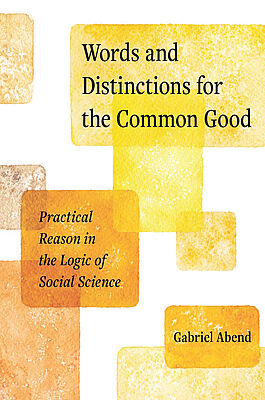
Gabriel Abend, Ph.D.
Professor of Sociology
Universität Luzern
Born in Montevideo, Uruguay
Studied Political Science and History at the Universidad de la República and Sociology at Northwestern University
Arbeitsvorhaben
Moral AI Decisions?
Concepts of choice, decision, and decision-making are ubiquitous. Look around you. People are often represented as decision-makers: they make lifestyle choices, health choices, love choices, and procreation choices. Soccer players, jazz musicians, drug addicts, brains and neurons, and nonhuman animals are depicted as making decisions, too. That "every day we make thousands of conscious and unconscious decisions" is a widespread idea, even a cliché. Look around you. Isn't choice a wonderful thing? It means freedom and autonomy. You're lucky you're free to choose. Always choose to be free to choose (to be free)! Above all, success is due to good decisions; failure is due to bad ones.As a sociologist, I'm interested in the social lives of concepts of choice and decision: what societies, organizations, and people do with them; what roles they play in institutions, practices, laws, and technologies; what their effects are; to whose advantage. I'm particularly interested in how AIs (artificial intelligence systems, robots, machines, algorithms) might be understood and represented as decision-makers, where the decisions at stake have to do with morality. Do contemporary societies attribute decision-making capacities to driverless cars and social robots? Moral decision-making capacities? Are machine-learning algorithms taken to make choices, morally unfair and biased choices, which discriminate against women and ethnic minorities? These are empirical questions for social science research. They also raise tough normative questions, whose legal and political ramifications require immediate attention. Should AIs be represented as agents that (or who) make choices? If they aren't autonomous decision-makers, who's morally, legally, and financially responsible for the consequences of their doings?
I don't know that my research will be able to answer these questions, though, in which case I'll just ask Alexa, Eliza, Sophia, or Ashley Too. They'll surely know.
Recommended Reading
Abend, Gabriel. The Moral Background. Princeton, NJ: Princeton University Press, 2014.
-. "The Limits of Decision and Choice." Theory and Society 47 (2018): 805-841. https://doi.org/10.1007/s11186-018-09333-1.
-. "The Love of Neuroscience: A Sociological Account." Sociological Theory 36 (2018): 88-116. https://doi.org/10.1177/0735275118759697.
Kolloquium, 19.10.2021
Ein Burrito ist ein Burrito ist ein Burrito
„Der Begriff X hat eine verwirrende Vielfalt von Konnotationen akkumuliert, die sich subtil voneinander unterscheiden. Nirgendwo wird diese Verwirrung besser dokumentiert als in den Protokollen der Konferenz zu X.“
„Obwohl der Begriff „X“ von Sozialwissenschaftlerinnen und Sozialwissenschaftlern häufig verwendet wird, ist er außerordentlich ungenau und bezieht sich in unterschiedlichen Kontexten auf eine verwirrende Vielfalt von Phänomenen.“
„Es gibt einen schwindelerregenden Zuwachs unterschiedlicher Definitionen von „X“, aber es ist nicht klar, in welchem Verhältnis sie zueinander stehen.“
„Leider gibt es in der Literatur keinen Konsens darüber, was als X gilt und was nicht.“
***
Warum eigentlich? Warum können sich die Sozial- und Geisteswissenschaften nie darauf einigen, was X ist oder worauf sich das Wort „X“ bezieht?
Diese Themen folgen konjunkturellen Zyklen. Im nächsten Frühjahr wird es eine weitere Konferenz zum Thema X geben, auf der sich die Fachleute wieder nicht auf die Beschaffenheit von X einigen können. Und auch nicht darüber, wie man X empirisch von Nicht-X unterscheiden kann.
In einer Sonderausgabe des Journal of X werden die Konferenzbeiträge veröffentlicht. Der Beitrag einer renommierten Wissenschaftlerin trägt den Titel „Zur Entwicklung eines besseren X-Begriffs“ oder „X: ein neuer Ansatz“. In Kommentaren und Antworten wird die Meinung vertreten, dass der neue Ansatz von X die Anforderungen nicht erfüllt.
Ist dies alles eine riesige Verschwendung von Zeit, Papier, Kaffee und Keksen? Wenn eine Gemeinschaft sich über die Definition von „X“ nicht einig ist, gibt es dann Methoden, um diese Angelegenheit zu entscheiden?
Man sollte erwarten, die Naturwissenschaften hätten solche Probleme nicht – dass z. B. unter Planetenforschern unumstritten ist, was ein Planet ist und ob Pluto einer ist. Man sollte meinen, dass Dispute über X in den Sozial- und Geisteswissenschaften nicht an hitzige Debatten im Internet erinnern, etwa darüber, was ein Sandwich ist – und ob Burritos und Hotdogs als Sandwiches gelten („Auf *gar* keinen Fall!!!“).
Und doch erweisen sich diese Erwartungen als unzutreffend.
Publikationen aus der Fellowbibliothek
Abend, Gabriel (Princeton, 2023)
Words and distinctions for the common good : practical reason in the logic of social science
Abend, Gabriel (Princeton, 2023)
Words and distinctions for the common good : practical reason in the logic of social science
Abend, Gabriel (London, 2019)
Thick concepts and sociological research
Abend, Gabriel (London, 2018)
The love of neuroscience : a sociological account
Abend, Gabriel (Dordrecht [u.a.], 2018)
The limits of decision and choice
Abend, Gabriel (Oxford, 2017)
Outline of a sociology of decisionism
Abend, Gabriel (Princeton, NJ [u.a.], 2014)
The moral background : an inquiry into the history of business ethics Princeton studies in cultural sociology
Abend, Gabriel (Chicago, Ill., 2013)
Styles of causal thought$nan emperical investigation

